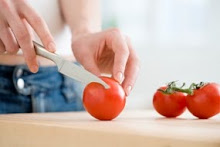I need simple backpacking recipes because there is never a stove in my backpack, even on week-long trips in the wilderness. I often backpack with less than fifteen pounds total pack weight, and total means all food, water - everything. It's often in a daypack, so I don't have much room for a stove and fuel cannisters.
I also don't want the extra weight. I don't want the extra trouble of cooking either. I prefer to spend my time to hiking and exploring and picking wild berries. I leave the stove home. If you've considered doing the same, try some of the following simple backpacking recipes to add a little variety to that diet of crackers, nuts and granola.
Peanut Butter And Wild Fruit
Peanut butter is a great backpacking food because it is so high in calories for the weight. Put some on a wheat cracker and top it with a few wild strawberries or raspberries for a healthy treat. My wife and I have eaten as many as nine different kinds of berries on one day hike, so you can have quite a variety of taste sensations with this plan.
If it isn't the season for wild fruit, you can bring along a handful of jelly packets borrowed from your favorite restaurant. If you bring jam or jelly from home, ditch the heavy glass jar, of course. Jelly in a small plastic tub will be lighter and safer, and should stay fresh for at least a few days.
Trail Mixes
A good trail mix is one of the most convenient backpacking foods. Here's my recipe for a good one: Mix peanuts, sunflower seeds, chocolate chips, and raisins in any proportions you like. Taste and adjust the quantities. Add whatever else you can think of and taste it again. Is that simple enough?
A Full Dinner Backpacking Recipe
Want a delicious dinner in the middle of the wilderness without cooking? Pack whole wheat crackers and two types of cheese. Hard cheeses, like a good smoked gouda last longest. Bring a foil pouch of tuna. These don't have to be refrigerated. Put a few olives in a zippered plastic bag with a small handful of baby carrots. Then get a boxed wine, drink all but about four glasses, remove the bag from the box and pack that.
Have this special meal on your first or second night out, while the carrots and cheese are still good. Prepare crackers with tuna on then. If you come across some wild onions, sprinkle some chopped up leaves or bulbs on these. Prepare crackers with the two types of cheeses and top these with the olives. The baby carrots will be ready to eat as is, and will have been flavored by the olive juices.
Enjoy it all with a water bottle half full of wine (I never carry a cup). The wine bag, by the way, can then be used to carry up to six quarts of water, or can be blown up and used (wrap in a sweater) as a pillow. These bags weigh less than three ounces and are very tough.
Salad Recipe
Backpacking doesn't have to mean giving up fresh foods, not even if you go really light. Throw a few carrots and radishes in a plastic bag and they're usually good for at least several days. Add some edible wild greens, like dandelion leaves, and some wild onion or peeled and chopped young thistle stalks, and you have a salad. Carry you veggies in a large zippered plastic bag, for easy mixing.
For dressing, get one of those eight-ounce plastic water bottles. These weigh less than an ounce and don't take too much room. Put a few ounces of olive oil in it (a great high-calorie backpacking food), an ounce of wine vinegar (or any other vinegar), and a pinch of salt, pepper and oregano. Add a touch of honey if you like it sweet, and a bit of cayenne pepper if you like it hot.
This should be enough for two salads. Just wash your salad ingredients, put them in the bag, add some dressing, close and shake. You can eat it right from the bag. The salad dressing container can be used as an extra water bottle when it is empty. I like backpacking recipes that keep it light, and multi-use containers help with this.
Resource: http://www.isnare.com/?aid=195209&ca=Food

No comments:
Post a Comment